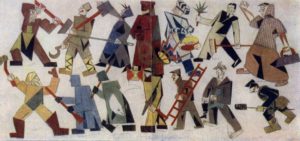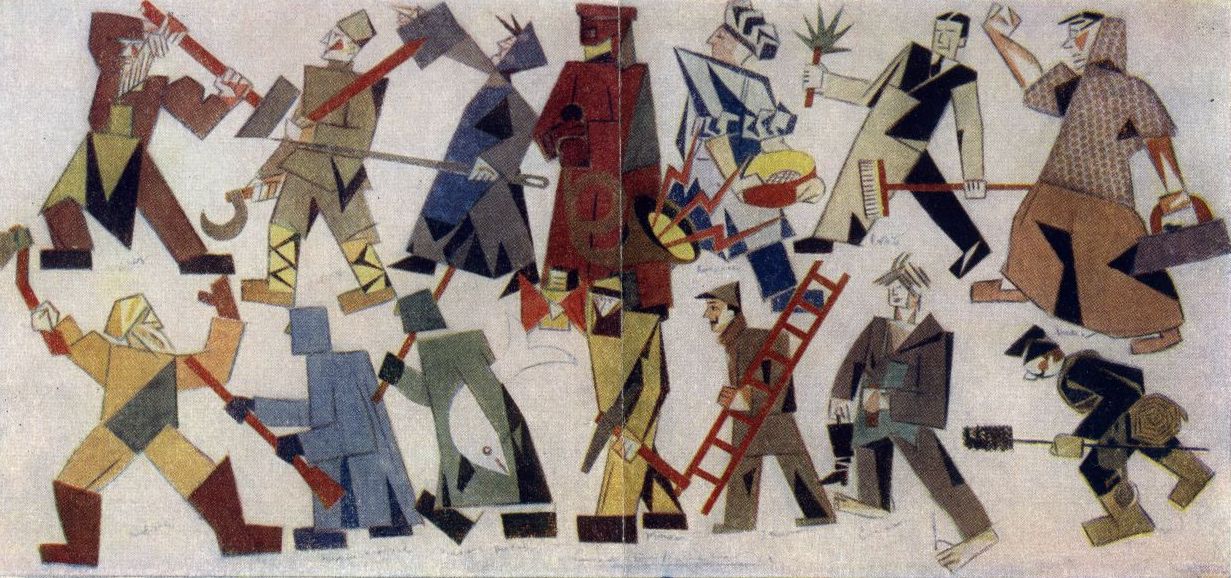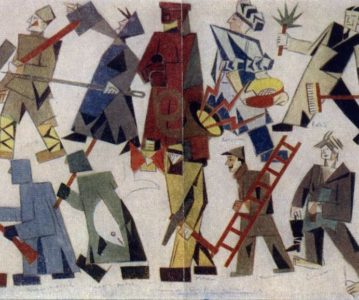Valentine Seebart critiques historical materialism, arguing that Marxists must replace this paradigm with a revised ‘ideo-materialist’ historical perspective.

Part One: Techno-Feudalism and the Historical Process
What was the historical process as described by Marx?
Marx put forward (as the basis of dialectical-materialist philosophy) that history was the product of evolving social conditions, and furthermore that social conditions were produced by economic conditions. Thus, through the process of evolving economically, humanity also evolves socially. This progresses to a a further question: where does economic development arise? Economic development, according to Marx, was a process of history itself, moving linearly from early tribes to feudal monarchies, to liberal (capitalist) democracies, and finally to ‘communist’ societies. The basic principle of orthodox Marxism is a self-assured historical vindication, it does not simply teach of an intention or goal, but rather of an inevitability; a trait which made Marx distinct within his time. As Marx would write in The German Ideology:
The production of ideas, of conceptions, of consciousness, is at first directly interwoven with the material activity and the material intercourse of men, the language of real life. Conceiving, thinking, the mental intercourse of men, appear at this stage as the direct efflux of their material behaviour. The same applies to mental production as expressed in the language of politics, laws, morality, religion, metaphysics, etc., of a people. Men are the producers of their conceptions, ideas, etc. – real, active men, as they are conditioned by a definite development of their productive forces and of the intercourse corresponding to these, up to its furthest forms. Consciousness can never be anything else than conscious existence, and the existence of men is their actual life-process. If in all ideology men and their circumstances appear upside-down as in a camera obscura, this phenomenon arises just as much from their historical life-process as the inversion of objects on the retina does from their physical life-process.
In direct contrast to German philosophy which descends from heaven to earth, here we ascend from earth to heaven. That is to say, we do not set out from what men say, imagine, conceive, nor from men as narrated, thought of, imagined, conceived, in order to arrive at men in the flesh. We set out from real, active men, and on the basis of their real life-process we demonstrate the development of the ideological reflexes and echoes of this life-process. The phantoms formed in the human brain are also, necessarily, sublimates of their material life-process, which is empirically verifiable and bound to material premises. Morality, religion, metaphysics, all the rest of ideology and their corresponding forms of consciousness, thus no longer retain the semblance of independence. They have no history, no development; but men, developing their material production and their material intercourse, alter, along with this their real existence, their thinking and the products of their thinking. Life is not determined by consciousness, but consciousness by life. In the first method of approach the starting-point is consciousness taken as the living individual; in the second method, which conforms to real life, it is the real living individuals themselves, and consciousness is considered solely as their consciousness.1
Here, Marx’s principle distinction between himself and his idealist contemporaries (and inspirations) is that while classical idealist philosophy assumes human creativity (ideals and myths) to be the origin of reality, he assumes reality to be the origin of the scope of creativity—the conclusion of this assumption being that humanity is beholden to its own material conditions in the shaping of its will. While Marx billed this philosophy as ‘scientific,’ each contain within themselves an equal share of metaphysical mechanics; the old (Hegelian) idealist model assumes that human will (collectivized into the Geist) is capable of directing the advancement of humanity forwards, while Marx’s re-imagination of history bars from humanity this metaphysical power, rather putting it into the hands of an equally undefinable entity, the historical process. Marxist historicism is, in this manner, a form of disenfranchised idealism, whereas the idealist may put progress in the divided hands of all conscious subjects, Marx sees it as belonging to the unconscious entity of economic development. Marx is to metaphysics what monotheism was to the religious pantheon, the power of the gods were not lost, only centralized into a single conceptual entity; history itself.
Unfortunately for us, Marx’s conception of historical development has proven to be less accurate than its inception in the nineteenth century. When Marx conceived of history as a linear (mechanical) process, he had justification to do so, however in present time a purely linear history is less realistic.
Yanis Varoufakis, a favored economist of the contemporary Left, put forward that capitalism, in fact, is in the process of undoing itself entirely and that what is soon to come (techno-feudalism) is an altogether anachronistic model disguised by cutting edge technological facilitation; evolution backwards. In an article describing the phenomena he begins by saying:
This is how capitalism ends: not with a revolutionary bang, but with an evolutionary whimper. Just as it displaced feudalism gradually, surreptitiously, until one day the bulk of human relations were market-based and feudalism was swept away, so capitalism today is being toppled by a new economic mode: techno-feudalism.2
Varoufakis argues that as Capital monopolizes power over the market, it begins to devolve away from its market nature. The fully actualized “techno-feudalism” is a society in which the marketplace is controlled by a single oligarchical firm, here insinuating that the natural process of monopolization endemic to capitalism is not simply self-destructive, but, rather, altogether re-definitory. Here is the primary flaw in the old Marxist alternative to idealism: if Varoufakis’s insinuation can be taken as correct, then historical development is not at all a linear process. In fact, Varoufakis’s model can even be seen as neo-idealist, in that it insists that it is not history which makes our conditions, but our conditions which construct themselves; it was not history that abolished capitalism, but capitalism which will abolish itself. The insinuation as such is that the collective self, Geist, is truly the origin of phenomena.
If we are to assume this insinuation to be correct, this offers us two further questions: If not the historical process, what (if any) is the origin of socio-economic development, and how has a reliance on the historical process disturbed the revolutionary movements of the past century?
To address the first question, it is not simple enough to re-substitute historical-materialism for idealism; after all, if idealism were accurate, Marxist historicism would have never arisen to contest it. Returning to the prior assertion, both idealism and materialism each possess their share of undefined variables. The idealist is incapable of concretely defining the manner in which ideals create reality, and the materialist of defining the rationale behind the ‘objective’ historical process. Instead of fruitlessly attempting to reconcile either as an ideology of their own, we should rather understand both as equal components of the machine of human progress. Marx was correct in arguing that material conditions construct the ideal. However, it is equally true that the ideal is the ultimate source of material conditions; the Geist constructs the condition and the condition constructs the Geist.
This ‘revised’ historicism is not one of linear development, but cyclical evolution. The material conditions of humanity construct the scope of its vision, and that vision itself constructs the material conditions upon the horizon. Every circumstance is in the process of defining its own future form.
To add an aggrandized portmanteau, such a cyclical model can be referred to here as ‘ideo-materialism.’
To answer the second question, an over-reliance on the historical process without a consideration of humanity’s role in constructing its own conditions has been highly disastrous in the field of Socialist revolutionary practice. Aside from being inaccurate, an over-reliance on an alienated historical process as the source of development engenders at best, malaise, and at worst, reaction on the part of revolutionaries who (after a triumphant revolution) surrender their agency to a faith in history. This unproductive attitude is best put forward in one of Mao’s famous quotations:
If we tried to go on the offensive when the masses are not yet awakened, that would be adventurism. If we insisted on leading the masses to do anything against their will, we would certainly fail. If we did not advance when the masses demand advance, that would be Right opportunism.3
This assertion (like most of his assertions) can be best refuted with another of his famous quotations:
History shows that wars are divided into two kinds, just and unjust. All wars that are progressive are just, and all wars that impede progress are unjust. We Communists oppose all unjust wars that impede progress, but we do not oppose progressive, just wars. Not only do we Communists not oppose just wars, we actively participate in them.4
It should be said that all progressive adventurism is justified adventurism, and all reactionary adventurism is unjustified adventurism; we must counter all unjustified adventurism with justified adventurism. We should not wait idly by for the ‘needs of the people’ and the ‘historical process’ to vindicate our insurrection, rather, we (armed with our own ideal vision) should be the instigators of the material condition in itself, we must change reality, not await the change which reality brings upon us.
Part Two: Capitalism died in 1991
There are two ways in which a thing dies. The first is to be destroyed, to have its physicality and agency ripped away, relegating its being only to memory. The second is to remove all contrast and definition, to reduce the context of a thing to such an extent that it can no longer be distinctly observed. As an example of this, picture a form drawn on a canvas: if one were to erase it the form would simply (and understandably) be gone. However, if we were to fill its counterpart of negative space with its own native pastel, it would also disappear; only now by the occultation of its own color. Death follows both undoing and invisibility.
At the end of the Cold War the Soviet Union saw a death of the first type. With client states quickly dissolving any formal cooperation, citizens no longer loyal to its then degrading ideology, and society itself buckling at the seams, the hollow bastion of twentieth century socialism sank back into the pool of reactionary ideology it had escaped from in nineteen-seventeen. A death like a shattered vase, its pieces quickly collected either as trophies, artifacts, or reused ideological tools. However it can equally be said that the capitalist West too died at this very moment, only in the second fashion. With the Soviet Union gone, the West had lost its most developed ideological enemy, in doing so it lost its own identity as well. The “new world order” would be the tomb of developed anti-communist ideology. Now that liberalism had become the only ‘viable’ ideology, it disappeared along with the question itself.
The next two decades would see a desperate attempt to reconstruct a conflict from which to find definition: the liberalization of the former Soviet Union, the continuation of the war on drugs, the war on terror, and the new economic ‘conflict’ with China. Unfortunately for the West, none of these conflicts have re-ignited the pictorial contrast of the Cold War. Each has fallen short and produced only a vague self-image, rather than clear self-definition. The dissent of capitalism into techno-feudalism cannot simply be understood as an immaculate historical shift towards anachronism. In fact it is an act of retreat on the part of an ideology which could no longer see itself clearly. With exhilarating narratives extinguished the mutual language of ideology regressed. If liberalism can be seen as more advanced than feudalism and socialism more advanced than liberalism, then a shift from socialism to liberalism in the East should understandably accompany an equal shift from liberalism to feudalism in the West. Arguably by the present day each has regressed even further.
If we can say that the death of communism was equally the death of capitalism, then it can be said that contradictory ideologies have their own “spooky action at a distance.”5 That is to say, they mirror each other along the axis of their contradiction. With communism at the height of its ideological development capitalism too saw a great deal of development (and vice versa) while with communism deconstructed capitalism has equivalently followed. The only difference of course is the nominal survival of capitalism, though this is rather unimportant. It can be said that the process of the Cold War, though antagonistic in nature, was truly an ideological (quantum) entailment of East and West.
In architecture, a structure which is kept stable by a mutual stress applied to all its parts (usually carried by suspended wires) is considered to be built on a system referred to as tensegrity. It can be said that an ideology which builds itself on dogmatic contradiction to its inverse, is also constructed upon this tensegrity. Should its enemy disappear and the reciprocal weirs of its suspended ideology snap, it too will lose any solidity. When politics are defined principally by what they are against, victory means death, solid foundation lies in a positive vision which is altogether sovereign from anything but itself.
Much as liberalism collapsed upon its victory over Soviet socialism, if a new socialism were to emerge victorious over the now crippled capitalism, yet it defined itself principally upon its anti-capitalist nature, it would collapse upon the eve of its revolution. Like all ideology, for socialism to be successful (after the revolution) its primary preoccupation must be the world it seeks to create, not just the one it needs to destroy; in this sense utopianism is the only stable ideological basis. If we dwell on our enemies, whether they be bourgeois, reactionary, or revisionist, we invariably become dependent upon them. It is only through a vision which exists fully detached from them that our victory would not destroy us.
Part Three: At the Top of My Voice
To reutilize a statement I put forward in an earlier piece:
The world we seek cannot exist without our willingness to observe it, there is no use in fighting if we cannot believe fully in what we are fighting for. The construction of a better world is reliant on our willingness to recreate our fantasies in our actions, to characterize our utopian ideals.6
What does this mean within the context of the present discussion?
We have covertly brought to attention two destructive loyalties which exist in the present revolutionary socialist community: loyalty to history and loyalty to our enemies. Both of these loyalties are an affront to our ideological sovereignty. When we speak the language of our enemies in a world constrained by our own historical rubric, what chance do we have? It is only when we ignore our cast shadows that we can move forward.
It is only through a persistent loyalty to a positive vision that any real change can be made. This positive vision is not one of hope, that cowardly cry of bourgeois philosophy, but rather one of pure and confident fanaticism. Instead of ‘hoping’ for a better world, we should make our raison d’etre the efficient and single minded establishment of the world we seek to construct. This is utopianism of an altogether different kind. Whereas the old ‘utopian socialists’ were simply those who believed in the reactionary principle of class collaboration (vestigial ancestors to modern social democrats), our utopianism should be quite the opposite. It should be rooted in a complete dispatchment from antagonistic classes, treating them not as architectural components of a historical-materialist firmament, but as nothing more than obstacles in the actualization of our own goals; in a sense, not utopianism of a deludedly hopeful fashion, but rather that of an aggressive, unyielding utopian spirit (Geist).
The construction of socialism should thus be primarily understood within the context of a collective self-actualization of human potential. Socialism as a process of self-mastery, self-mastery on the part of an entire society. This necessitates a revival of a vision of socialism now gone, the vision which died in the purges, was lost in the bureaucracy, and forgotten in the propaganda, a vision of socialism not as capitalism’s eternal and defining nemesis, but as its own, agitated, and beautiful ideology.
We should not feel the need to justify our goals beyond their pure ecstasy. As Mayakovsky wrote:
We opened / each volume / of Marx / as we would open / the shutters / in our own house; / but we did not have to read / to make up our minds / which side to join, / which side to fight on. / Our dialectics / were not learned / from Hegel.7

- https://www.marxists.org/archive/marx/works/1845/german-ideology/ch01a.htm
- https://www.project-syndicate.org/commentary/techno-feudalism-replacing-market-capitalism-by-yanis-varoufakis-2021-06
- https://www.marxists.org/ebooks/mao/Quotations_from_Chairman_Mao_Tse-tung.pdf
- Ibid.
- https://www.science.org/content/article/einstein-s-spooky-action-distance-spotted-objects-almost-big-enough-see?cookieSet=1
- https://prometheanmagazine.com/index.php/2022/04/08/theater-of-the-state/
- https://www.marxists.org/subject/art/literature/mayakovsky/1930/at-top-my-voice.htm




